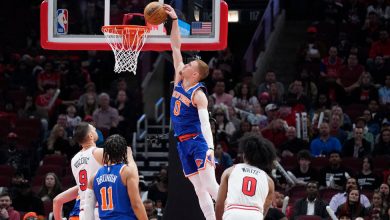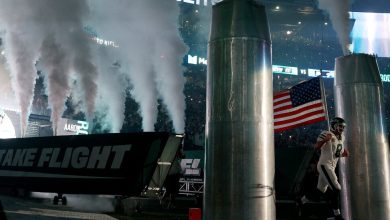A World Series of Relievers — Like It or Not

ATLANTA — Greg Maddux leads all living people in major league victories, with 355. He tossed the ceremonial first pitch before Game 5 of the World Series on Sunday at Truist Park. Tucker Davidson is tied with roughly 7.8 billion other people for last place in major league victories, with zero. He threw the first pitch that counted.
“Walking out to the bullpen to warm up, I definitely soaked it in,” Davidson said later, after the Houston Astros beat Atlanta, 9-5. “People were chanting my name, kind of taking that all in. Whenever you get out there, it felt like another game.”
Another game, that is, in this most unusual World Series, which the Atlanta Braves lead, three games to two, as the scene shifts to Houston for Game 6 on Tuesday. Davidson collected six outs in his sixth major league start, which made him seem like a durable workhorse like Old Hoss Radbourn compared to Atlanta’s Game 4 starter, Dylan Lee, who got one out in his first major league start.
“I was shocked, of course,” Lee said after Game 4, when asked for his reaction when he got his assignment that afternoon. “But I know that I’m a reliever now.”
If you like relievers, and lots of them, this has been the World Series for you. Every game has included at least 10 pitchers. Relievers have worked a staggering 63 percent of all innings (55 of 87), and no starter has pitched more than five in a game.
“You can say starters are getting cut short or bullpens are getting extended,” Atlanta reliever Luke Jackson said. “It’s one of those things: Is it good for us in the bullpen? I guess. We have a job now, which is kind of cool. We’re all ready to pitch every night, whether that’s the third inning to the ninth inning.”
This is not how the teams designed it. The majors’ active leaders for innings pitched, Zack Greinke and Justin Verlander, are the two highest-paid Astros. But Greinke wore down late in the season and felt tired after four innings in Game 4. Verlander is still recovering from Tommy John surgery.
Houston opened the playoffs with Lance McCullers, who worked six and two-thirds stout innings to beat the Chicago White Sox in Game 1 of the division series. Then he strained his forearm in Game 4, ending his postseason.
Injuries have also ravaged Atlanta’s starters. Mike Soroka, an All-Star in 2019, tore his right Achilles tendon in August 2020, and tore it again in May, nine months into his recovery. Another young starter, Huascar Ynoa, broke his pitching hand when he punched a dugout bench in May. Then he hurt his shoulder in the playoffs.
And like the Astros, the Braves also lost the starter who opened their playoff run. A comebacker ricocheted off Charlie Morton’s leg in Game 1 of the World Series, and he was later found to have a broken leg. Atlanta did not exactly have Maddux in reserve. Davidson, who made four starts this season and was staying loose at the team’s Class AAA ballpark, took Morton’s roster spot.
It is important to consider those factors before eulogizing the starting pitcher. Yes, the lack of durability among starters was a theme all season, with only four pitchers in the majors working 200 innings. This has been a trend for a while, but the pandemic-shortened 2020 season accelerated it. Teams were especially cautious of pushing pitchers too far, and many pitchers got hurt, anyway.
The last World Series, pre-Covid, was a showcase for elite starters. That 2019 matchup, between the Astros and the Washington Nationals, included five starters who worked 200 innings that season: Greinke, Verlander and Gerrit Cole for Houston, and Max Scherzer, Stephen Strasburg and Patrick Corbin for Washington. Strasburg even pitched into the ninth inning of Game 6.
If anyone has a chance to get close to the ninth this time — or at least close to the seventh — it is Max Fried, who will start Game 6 for Atlanta. Fried lost Game 2 but was not hit hard, and he even faced two batters in the sixth inning. After patching together two bullpen games, Manager Brian Snitker should have it easier with Fried on Tuesday.
“He’s ready to go,” Snitker said after Game 5. “We had him in reserve if something happened today. If we got locked up in extra innings or whatever, we were going to run him down there and possibly use him today also. I always feel good when Max pitches. He always gives you a chance to win.”
Fried — who is 40-18 with a 3.34 earned run average in his career — will have an extra day of rest for Game 6. Astros Manager Dusty Baker, meanwhile, seems likely to use his Game 3 starter, Luis Garcia, on short rest. That is because Baker needed Jose Urquidy for an inning on Sunday after starter Framber Valdez fizzled out in the third.
“We’re down to kind of Garcia at this point,” Baker conceded after the victory. “When you’re down 3-1, you’ve just got to kind of pull out all the stops to your rotation. If a guy’s tired, it really doesn’t matter because your next step is home, and we weren’t ready to go home. All the guys gutted it out.”
Four Astros relievers have especially stood out this postseason: Ryne Stanek, Phil Maton, Kendall Graveman and Ryan Pressly. That group has combined for a 1.33 E.R.A. with 47 strikeouts in 40 ⅔ innings. For the Astros to win, they will need to keep it up.
“Those four guys — I would say probably everyone in the bullpen — has been our strength this postseason,” catcher Martín Maldonado said. “They’ve been keeping us in the ballgame. They’ve been holding the lead for us. Every pitcher is different, and they attack the hitter.”
A procession of low-profile, high-octane relievers on the attack is the defining image, so far, of this World Series. It is not an easy sell for baseball, and sinking TV ratings have reflected that.
Baseball has tried to limit the bullpen parade with the rule that requires each pitcher to finish an inning or face at least three batters. But as long as there are so many strong relievers on postseason rosters, savvy analysts will encourage managers to chase favorable advantages. Games will continue lasting deep into the night, and the fans still watching will chug energy drinks to try to keep up.
The pitching puzzle of this World Series is something of an outlier, largely a reflection of unforeseen circumstances and bad luck. But it highlights the need for teams to cultivate starters, trust them to work out of jams and keep them healthy enough to perform deep into the fall.
Doing so can only help the entertainment value of baseball’s signature event — unless you happen to be a World Series reliever. If you are, style points don’t matter.
“As long as we win,” said Atlanta’s closer, Will Smith, “we don’t really care.”



